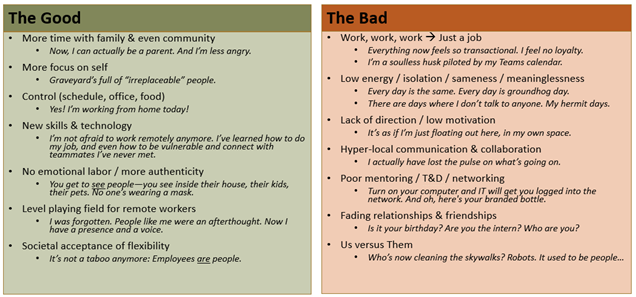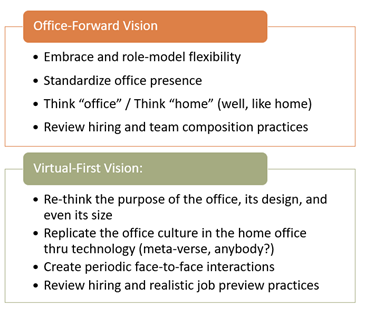Most of us have experienced, read about, or talked about hybrid workplaces more in the last year than in the previous decade. As the war for talent continues, organizations are constantly evaluating the most appropriate solutions for their businesses and their employees.
Holmes Murphy hosted an employer roundtable on March 28 to discuss what we are learning about hybrid workplaces and best practices for the future. I am thrilled as we got a chance to learn from a friend and a Professor of Leadership and Management at Drake University, Dr. Radostina (Ina) Purvanova.
Dr. Purvanova started researching online learning and leadership in the 1990s and expanded this knowledge into our timely conversation about remote and hybrid workplaces. In fact, Dr. Purvanova is actually collaborating with Dr. Alanah Mitchell, from Drake University, on post-COVID workplace trends.
I wanted to use this blog opportunity to share some statistics and information from their research and interviews of over 120 employees from different local organizations. As a side note, Holmes Murphy also ran a survey with our employer roundtable group prior to our discussion to better understand what local employers are thinking and doing around hybrid work schedules. Here is what we all learned!
Remote vs. All-in vs. Hybrid Employee Preferences
The COVID-19 pandemic pushed our workforce to re-examine how we approach work-life balance and helped employees reestablish new bonds and appreciation or our families.
Now, post-COVID-19 world is focused on reimagining the new workplace and emergence of specific work preferences from employees.
Preliminary data from Drake University research shows the following preferences:
- About 20 percent of those surveyed prefer to work remotely from home.
- The same percentage — about 20 percent — prefer to work from the office.
- The rest, roughly 60 percent, prefer a blended approach.
Our Holmes Murphy remote survey indicated the below responses for 81 employer current workplace schedules:
- 32 percent had an all in the office arrangement.
- 29 percent had a full flex schedule with employee deciding to work remote or in the office.
- 39 percent were flex schedule with in-office minimum expectations (example: 2-3 days in the office. 2-3 days flexible.)
The Good vs. The Bad of Remote and Hybrid Work Schedules
Through the interviews with employees, Dr. Purvanova discovered great insights for the employee preferences based on the remote or hybrid work schedules:

Surprising Employee Demographic Findings
A couple of surprising discoveries for our participants were around the workforce demographic interested in the hybrid schedule model.
When looking at gender, there is no one gender more interested in hybrid schedule. There is equal demand among men and women.
Another surprising fact was around the age demographic demand. In the poll, participants predicted/guessed that less experienced employees (i.e., younger, less tenure with company) would have higher demand for hybrid schedules compared to more experienced employees (i.e., older, greater organizational tenure). In reality, the data shows the opposite! Less experienced employees would prefer to be in the office more where they have more access to mentors and are able to establish valuable relationships.
As many of you know already, there is no perfect answer to the remote/hybrid/in-office solution. What your organization does really is based on your own knowledge of your population and your organizational vision.
Lastly, I want to share a few points of advice for office-forward and virtual-first vision:
We Commit.Fully. to Collaboration
I hope you found all of this information interesting and helpful as you go about discovering and implementing what works best for your employee population.
At Holmes Murphy, our commitment will be to continue to support you as employers to help you connect to learn about best-in-class solutions and network with each other and share resources.
Our next Employer Roundtable is April 18th focusing on compensation trends and strategies. I would love to see you there, or at our May 4th event about Pharmacy trends.
If you would like to get on the distribution list for the employer roundtable group, please reach out to me. You can also chat with your Holmes Murphy representative. We’d love to have you join us!






